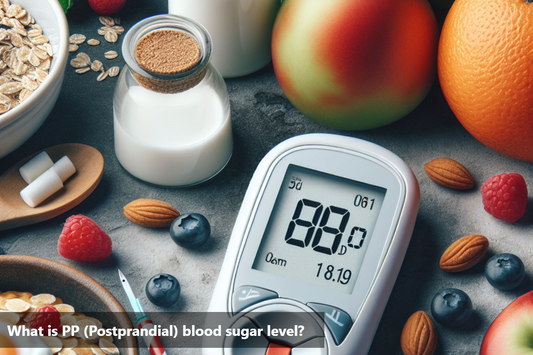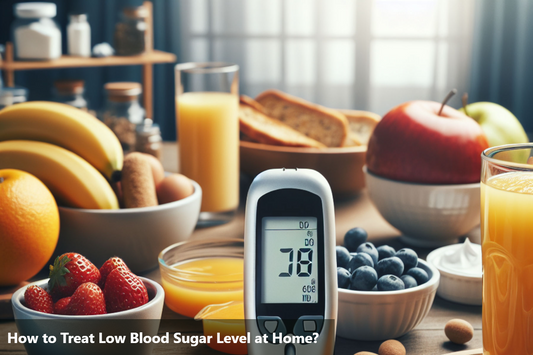Diabetes is a disease that can affect one’s life severely but also one that can be managed and avoided through following healthy habits. According to the International Diabetes Federation, approximately 537 million people are currently suffering from diabetes all over the world. The prevalence of ‘young diabetes’, i.e., diabetes in people below 35 years of age has been rapidly increasing over the past few years and more than ever, it is important to follow a lifestyle, built on habits that help in avoiding and managing diabetes.
Habits are automatic behaviours or behaviour that are repeated regularly. Your every day habits can have a positive or a negative impact on your health. As James Clear, author of the famous book, Atomic Habits points out, "the habits you repeat (or don’t repeat) every day largely determine your health, wealth, and happiness."
Being a diabetic, developing the right habits and sticking with them throughout can completely transform your everyday life. You can start feeling more energetic, gain better control over blood sugar levels, cut back on the extra weight and even put diabetes into remission, eventually!
4 habits you need for dealing with type 2 diabetes better
Shed the excess weight
- Being overweight or obese significantly increases your risk of Type 2 diabetes and makes it harder to manage it after diagnosis.
- Even with a normal BMI, you may be at risk of developing Type 2 diabetes, because of what is known as ‘skinny’ or ‘visceral’ fat - the fat that we carry around the midsection of the body, i.e., the belly and abdominal area.
- Losing weight is a crucial step toward living a quality life with diabetes. Take steps like transforming your eating habits and working out more frequently in order to prevent any further complications and diseases related to excess weight and obesity.
Sleep better, live better
According to the Centers for Disease Control and Management, make sure to get at least 7 hours of sleep every night in order to manage your diabetes better.
This is because, if you sleep less than 7 hours, your body’s insulin resistance is likely to be increased, which interferes with sugar levels and you feel hungrier than normal, which interferes with your health and weight loss routine.
Some simple habits that help you sleep on time and for longer periods of time include:
- setting time limits on your mobile phone applications
- making the room darker at night by switching off lights
- setting an alarm for when you need to go to sleep
- keeping away any electronic devices half an hour before bedtime
- drinking something warm before bed
Exercise regularly and consistently
Whether or not you have diabetes, exercising regularly and keeping the body active have numerous health benefits.
ADA recommends at least 150 minutes of moderate-intensity workout per week, for improving blood glucose levels and reducing the risk of other serious complications like cardiovascular diseases.
Even after you’ve been diagnosed with diabetes, exercising is one of the best ways of heading towards the remission of diabetes. It is advised to check pre and post-workout glucose levels and consult with your medical team before starting a workout routine consistently, especially if you take medications to lower your blood sugar levels.
Make sure to work out all the muscles of the body and not just a few. Try to make both aerobic exercises and strength training a part of your workout routine, at least consecutive days of the week.
Incorporating small habits in your day-to-day life, like taking the stairs instead of elevators, going on walks after meals, drinking more water and cutting back on sugar are also beneficial in the long run.
Switch to a low-carb diet
Studies indicate a rather precise relationship between carbs and diabetes. Some have shown that a high-carb diet significantly increases the risk of developing type 2 diabetes. On the other hand, it has also been found that low-carb meals are linked to a lower risk of diabetes.
Carbs are ultimately turned into glucose by our bodies for energy, which can raise blood glucose levels if not regulated efficiently through insulin. Some habits you should develop to ensure your meals are diabetes friendly:
- Eating fruit instead of fruit juice
- Using other sweeteners instead of sugar, such as stevia
- Considering non-starchy vegetables for meals
- Keeping a log of carb intake, either digitally or by writing it down
- Switching to low-carb flours
Moreover, consuming a protein, fibre and micronutrient rich meals, can improve your health, ultimately preventing diabetes to a great extent.
Lo! Foods provides meals and a wide range of low-carb, ketogenic food options that help you lose weight and enjoy savoury delights as well.
The bottom line
Diabetes is a chronic condition that affects over 537 million people worldwide. It is a progressive disease but can be managed and prevented by following healthy habits related to what we eat and how active we are.
Our bodies have evolved to move. Ensure that you are active most days of the week as sedentary behaviors are a major risk factor for Type 2 diabetes and exercising consistently is one of the best ways of controlling and preventing diabetes.
Additionally, what we eat also contributes to the risk of developing diabetes. Remember to avoid too many carbs and highly processed foods for lowering the risk of diabetes. Stay happy, healthy, active and nutrition-wise.
This Blog post is an initiative by DiabeSmart, to provide accurate and Nutritionist / Doctor approved information related to Diabetes. DiabeSmart is India's first Food brand designed specifically for Diabetics, that has been clinically tested on Diabetics and Pre-Diabetics to deliver 55% - 70% lower Sugar spikes. DiabeSmart is part of Lo! Foods - India's leading brand for Everyday Functional Health foods.







